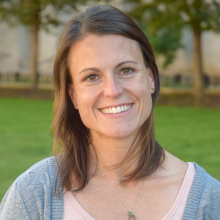January 2015 Spotlight on the SRCD Policy Fellow: Nina Philipsen Hetzner, Ph.D.
2014-2015 Federal Executive Branch Policy Fellow
I am a second year SRCD fellow in the Office of Planning, Research and Evaluation (OPRE). As the research arm of the Administration for Children and Families (ACF), OPRE studies the programs and the populations served by ACF. I work mostly on the Head Start research portfolio within the Division of Child and Family Development.
While the bulk of the first year was spent getting my bearings, the second year in the fellowship is allowing me to settle in and gain a deeper appreciation for the unique role OPRE, specifically the Division of Child and Family Development (DCFD), plays in the larger early care and education (ECE) context. I’ve learned about OPRE’s role through opportunities such as collaborating with ECE experts, integrating information across multiple projects, and accessing the perspectives and priorities of practitioners and policy makers.
I have had the opportunity to collaborate with a variety of ECE experts while working on research contracts. For example, in planning for a sub-study on family engagement (part the Head Start Family and Child Experiences (FACES) study ─ a large, multi-faceted, nationally representative survey of Head Start children, staff, and families) together with our contracted research team, we convened a group of experts who spanned sectors and disciplines. The group included academic researchers and practitioners who helped us think through the most pressing research questions, the constructs to be tested, and the measures to be used. Similar expert panels have been convened at various stages of other projects I’ve work on, as well. Bringing together experts from various backgrounds to inform research is a significant part of our work at OPRE, provides a great model for working in teams, and also serves as exposure to various professionals in our field, adding to the richness of the fellowship experience.
My experiences at OPRE have given me the unique opportunity to work on a number of related projects simultaneously teaching me to view projects within a larger context and to integrate findings across studies. Many of the projects we have within DCFD have some overlap and can inform one another. This is especially true of three projects I am currently working on: Child Progress Monitoring (CPM), Head Start School Readiness Goals, and the Leadership, Excellence, and Data Systems (LEADS) Project. Each of these addresses some aspect of data use for program quality improvement in Head Start. While each project has a slightly different focus and approaches data-use questions with different methodologies, many common themes are arising across the three projects. Taken together these projects are much more powerful than any individual one for informing policy, practice, and future research.
I have also been given the unique opportunity to work with colleagues in the political offices as well as in the program offices and have therefore learned about other offices’ perspectives and priorities as a result. This has encouraged me to consider the practical and political significance of our research findings and to disseminate them in a digestible and useful format to multiple audiences. For example, together with another SRCD fellow from the Office of Head Start (OHS), I have been involved in planning monthly, joint research meetings for OPRE and OHS staff. We discuss recent research findings, how they might be interpreted, and their application for policy and practice. Additionally, OPRE reports to Mark Greenberg, the ACF Acting Assistant Secretary, on a regular basis about upcoming reports, publications, and project developments. I was recently given the opportunity to present at one of these briefings. Preparing for the presentation gave me a great deal of insight into how to make research findings useful to a policy-focused audience. Merging research and practical implications is one of the most critical – but challenging – aspects of our work. Doing this work with our ACF colleagues has given me an appreciation for the program and policy perspectives.
Through my fellowship position at OPRE, I have had the unique opportunity to collaborate with various ECE experts, to integrate information across multiple projects, and to learn more about the perspectives and priorities of practitioners and policy makers. I am so grateful for these opportunities and am deeply indebted to my OPRE colleagues, to Marty Zaslow, and to the other SRCD fellows for making this fellowship such a rich learning experience.
